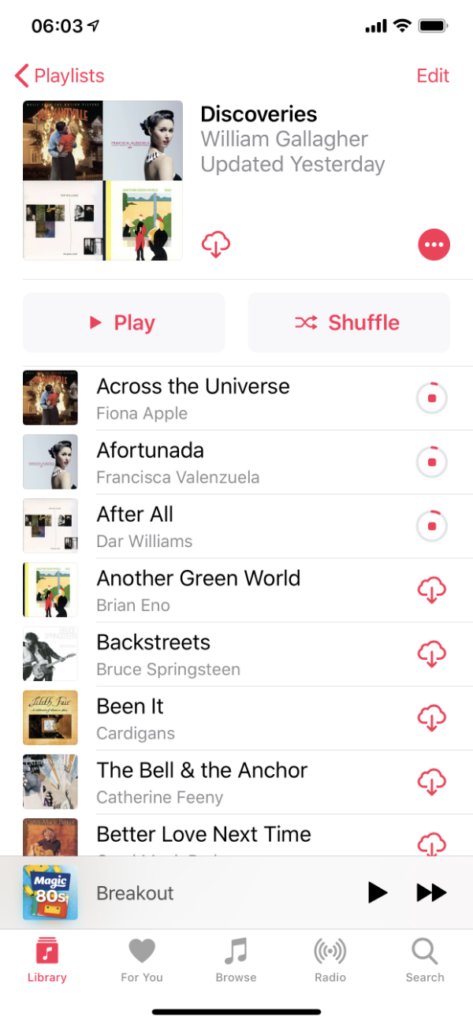Tell me you do this too. There’s a song or come piece of music that you get so obsessed with that you not only could play it on a loop, but you do.
It’s often when I’m writing and I thought both that this was a little peculiar and also nuts to peculiar, I ain’t stopping now. More than fifteen years ago, I created a playlist called Discoveries and only ever added a track to it when it had been one I so obsessed over.
The rule was even more specific than that. It had to be a piece I had been drawn to play so often that I was eventually sick of it. My Discoveries playlist became around 130 songs, all of which I now loathed.
Well, a bit.
Whenever I really needed to concentrate on whatever I was writing, I would pop headphones on and tell iTunes to shuffle Discoveries. I might skip the odd track if it really was so recent that I’d gone off it, but usually I’d let everything play and I’d have a grand time.
There is one more rule and one strong guideline.
The guideline is that I avoid allowing too many tracks by the same artist. With 130 tracks or whatever it became, having the entire discography of Suzanne Vega in Discoveries would just be wrong. Tempting, but wrong.
And the rule is that once it goes into Discoveries, it cannot be taken out. Not ever. Which means that it’s not enough to be a hit I quite like, I have to really, really obsess. If I can’t listen to the one same track a hundred times in a row, it ain’t good enough to be included.

And this cannot be premeditated or even considered. It has to be that I am compelled right now to add it. I’ve been got to the stage recently where I’ve made a Discoveries Contenders playlist.
Here’s how hard it is to get into my playlist. I have only one Suzanne Vega song in it. That surprised me a lot. That surprised me so much that I must surely revisit her albums, I’d have been certain most of her Songs in Red and Gray album would be in here already.
Now that I’m looking, I see that I’ve got two by Regina Spektor. Three by Kate Bush. Four by Tanita Tikaram. Five by Dar Williams. And I didn’t expect this: seven by Bruce Springsteen.
I have also made some choices I regret.
But at some point I read an interview with – I think – Anthony Minghella. I don’t believe he has a Discoveries playlist, but there was some comment about how he would have single songs on endless repeat. I hope it was him, I’d rather be a little bit like Anthony Minghella than a lot like the nutter I thought I was.
And then there’s this. Last night, I was in a supermarket queue and it really, really slowly dawned on me that nobody else was dancing.
I was wearing AirPods, these blissful wireless headphones, and I was shuffling Discoveries. To be specific, I was being incapable of standing still because I had Tómame by Francisca Valenzuela in my ears.
And as I’d left my car, as I entered the supermarket and as I walked down aisle 9, I wasn’t humming the lyrics, I was instead saying “Hey, Siri, play that again”.
Valenzuela is a Chilean singer and I rarely understand a word of her songs – weirdly, I never like her English-language ones as much – and right now she has six tracks in my Discoveries.
And here’s the other thing. It took at least fifteen years to get to somewhere around 130 tracks. But in the last three years I’ve added another 110.
That’s entirely because of streaming. I subscribe to Apple Music and with one single exception, all 110 new additions to Discoveries come from that service. The exception is Kate Bush’s reggae cover of Rocket Man which I had to actually buy. I barely remembered how to do that.
This is on my mind because of the supermarket dance. It’s also on my mind because if it’s streaming music that’s got me several Francisca Valenzuela tracks, it was iTunes that got me my first back around 2007.
I worry about how artists must get lost in the flood of our being able to listen to just about anything at any moment and for practically no cost.
But I’m not kidding about dancing in Asda and I’m really not kidding about my Discoveries playlist. You and I can immediately listen to any of millions of songs yet I will play the same one over and over again as I write.
Imagine writing something that a stranger obsesses over, internalises, and lives for.
While I piddle about making playlists.